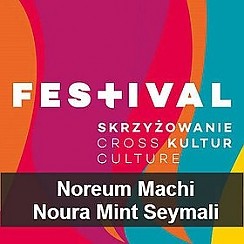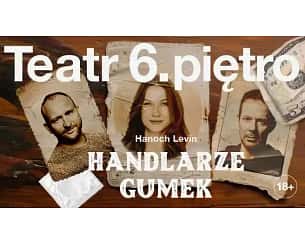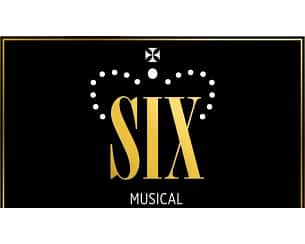11. FESTIWAL SKRZYŻOWANIE KULTUR
11. FESTIWAL SKRZYŻOWANIE KULTUR
NOURA MINT SEYMALI , Noreum Machi
27.09.2015 19:00
Warszawa(Mazowieckie) - Namiot festiwalowy przed PKiN
Noreum Machi / Korea Południowa
Perkusyjny zespół Noreum Machi to jeden z najoryginalniejszych przedstawicieli koreańskiej nowej fali. Założony na początku lat dziewięćdziesiątych do dziś zdołał zebrać wielu wielbicieli i niezwykłe uznanie krytyków. Ich występy cechują się niezwykłymi perkusyjnymi dialogami, szamańskimi pieśniami i akrobatycznym tańcem. Repertuar grupy opiera się na tradycyjnych koreańskich melodiach, które reinterpretują i dostosowują do współczesnej publiczności jednak z zachowaniem ich autentyczności i naturalnej konstrukcji.
Nazwa grupy odnosi się do określenia perfekcji muzycznej, używanego niegdyś przez koreańskich rybałtów. Noreum Machi byłby tym, który osiągnął tak doskonałe zdolności i wyczucie, że nikt nie śmiałby po nim występować.
Ich rytmiczna muzyka, nierozerwalnie połączona z tańcami, ma związek z odległymi rytuałami animistycznymi i szamanistycznymi zwanymi Samul-nori. W języku koreańskim oznacza to cztery obiekty, w tym wypadku czterema przewodnimi tradycyjnymi instrumentami perkusyjnymi. Każdy z nich symbolizuje jeden z żywiołów: Jang-gu - deszcz, Buk - chmury, Jing wiatr, a Kkwaenggwari burzę. Ich wykorzystanie nawiązuje również do równowagi Yin i Yang, gdyż Buk i Jang-gu odtwarzają brzmienia ziemi, a Jing i Kkwaenggwari nieba.
Zespół koncertował w wielu krajach na całym świecie, w tym Brazylii, Kanadzie, Niemczech, Hiszpanii, Arabii Saudyjskiej, Maroku.
ANG
Noreum Machi / South Korea
The Korean percussion group Noreum Machi is a highly original musical ensemble. Since its foundation in 1993, Noreum Machi has been trying to re-discover its traditional music that suits our time by communicating other kinds of music through the basic traditional Korean music without losing its structure. Their performances characterize with spectacular percussion dialogues, shamanic chants and acrobatic dances! Noreum Machi is a captivating group that performs the virtuosic percussion, vocal and dance tradition.
The group takes its name from the term used by Korean minstrels to indicate a combination of skill and timing attained only by the best players. In competition “Noreum Machi” would refer to the player so skilled that no one would dare follow.
Noreum Machi specializes in the virtuosic percussion music known as Samul-nori which is modernized-staged adaptation of the ancient famers’ ritual that had its origin in shamanism and animism. Samul-nori (Samul means “four objects” and Nori means “play”) is performed primarily with four traditional instruments; Jang-gu, Buk, Jing, and Kkwaenggwari. Other instruments used are the Taepyongso and Piri. Each of the four main instruments represents different elements of nature: the Jang-gu represents Rain, the Buk Clouds, the Jing Wnd, and the Kkwaenggwari Thunder Storm. Yin and Yang is also reflected: the Buk and the Jang-gu represent the sound of the earth, while the Jing and the Kkwaenggwari represent the sound of the heaven.
The band performed in many countries all around the world including Brazil, Canada, Germany, Spain, Saudi Arabia, Morocco.
Noura Mint Seymali / Mauretania
Artystka pochodzi z jednej z najsłynniejszych, mauretańskich rodzin griotów, czyli opowiadaczy, muzyków, bardów. Jej ojciec - Seymali Ould Ahmed Vall był światowej sławy muzykiem, który opracował pierwszy system zapisu mauretańskich melodii, zaadaptował muzykę do hymnu narodowego i komponował dla swojej żony (macochy Noury), wybitnej Dimi Mint Abby, nazywanej Diwą Pustyni. Noura, już jako nastolatka występowała w chórkach Dimi Mint Abby, a dziś bierze na swoje barki rozwój muzycznego dziedzictwa Mauretanii, dostosowując je do współczesnego rytmu świata. W jej kompozycjach, artystycznej konsekwencji i skłonnościach do eksperymentów, możemy odnaleźć echa twórczości jej wizjonerskich przodków.
Artystka występuje wraz ze swoim mężem, utalentowanym gitarzystą Jeiche Ould Chighaly, który wprowadza do zespołu potężną dawkę siły z innego, muzycznego rodu Mauretańczyków. Wspólnie łączą elementy tradycyjnego azawan i backbeat’u. Ardine (9-strunowa harfa, na której wedle tradycji grają tylko kobiety) i tidinit (tradycyjna hassańska gitara) tworzą razem – azawan – wiodące połączenie instrumentalne w mauretańskiej tradycji muzycznej. Jednak w ich zespole, bas (Ousmane Touré) i perkusja (Matthew Tinari), przełamują azawan niezwykłym współczesnym funkiem i popem. Album Tzenii to kombinacja kilku klasycznych utworów zaaranżowanych zgodnie ze współczesną formą i okraszonych odrobiną nowoczesnego popu. Album można postrzegać jako poszukiwanie wiary i stabilności w chaosie. To obracanie istniejącego na świecie zła w dobro.
Pradawna tradycja zmiksowana z nowoczesnością oraz wyjątkowa energia, pasja i hipnotyzująca charyzma Noury Mint Seymali gwarantują niezapomniane doznania muzyczne podczas koncertu 11. Edycji Festiwalu Skrzyżowanie Kultur.
Noura Mint Seymali / Mauretania
She comes from one of the most famous, ancient family of Moorish griots: story tellers, musicians and bards. Her father Seymali Ould Ahmed Vall, was a world famous Mauritanian musician, a seminal scholar figure in Mauritanian music; studying Arab classical music in Iraq, devising the first system for Moorish melodic notation, adapting the national anthem, and composing many works popularized by his wife, the great Dimi Mint Abba the ‘Diva of the Desert’ – Noura’s step mother. As a teenager Noura was a backing vocalist with Dimi Mint Abba while her grandmother Mounina, trained her in instrumental technique mastered the ardine, a 9-string harp reserved only for women. Noura Mint Seymali now drives the legacy forward, re-calibrating Moorish music for our contemporary moment. Her band’s arrangements, rigor, and experimental spirit may be understood as a continuation of the tradition of Seymali, Dimi, her grandmother Mounina, and countless others.
Together with her husband, heroic guitarist Jeiche Ould Chighaly, who brings the force of yet another powerful branch of Moorish musical lineage, the band on this recording was conceived as a distillation of essential elements, the “azawan” and the backbeat. The ardine & tidinit (or guitar) together are the “azawan,” the leading ensemble of Moorish traditional music, while bass & drums, played here by Ousmane Touré and Matthew Tinari, fortify it with genre transcendent funk and a basic pop urgency. But the album is also about the power of faith, serenity and joy, in the face of all these things that are beyond our control. It is about recreating the evil existing in the world into good.
Noura fuses ancient and modern Moorish influences, blending psychedelic guitars and transcendental grooves with impassioned and hypnotizing commanding vocals. Her unique energy, passion and charisma are a guarantee of an unforgettable musical experience during her concert at th 11th Cross-Culture Festival.
Powiązane
Koncertomania poleca wydarzenia i koncerty w Warszawie



















